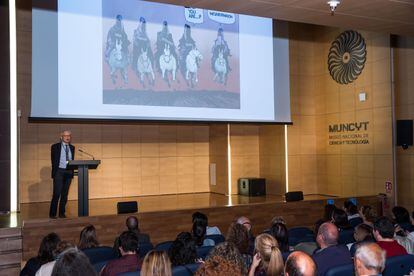Jonathan Osborne, a renowned expert in instruction, thinks that universities usually fall short to express the wonders of science | Science & Tech
/cloudfront-eu-central-1.images.arcpublishing.com/prisa/YESZH2JLTBDENLIF24JGRFPLFE.jpg)
Dr. Jonathan Osborne, Professor Emeritus in Science Schooling at Stanford College, defends “the professionalism and specialization of industry experts in the post-truth period.” In the encounter of individualistic discourses, in which accessibility to understanding has led some persons to consider that they are alien to other individuals, the professor warns that we nevertheless will need an infinite selection of specialists versed in their topics. Osborne, who was the chairman of the imagine tank liable for creating the OECD’s framework for assessing the scientific know-how of students in in excess of 100 nations around the world, has been a instructor for a long time.
Right after graduating in physics, he went into training, equally at secondary and college degree, at King’s University London in the U.K. His exploration focuses on locating the best methodology to instruct science, know-how, engineering and arithmetic (STEM). The professor sat down with EL PAÍS at the Nationwide Museum of Science and Engineering in Madrid to share his views on science schooling in today’s environment
Problem. What function does science play in today’s modern society?
Reply. We depend epistemically on the abilities of researchers, just as we do on plumbers and medical professionals. Our scientific being familiar with of the globe is 1 of humanity’s finest mental achievements. I want that a lot more people today would be able to reveal why this is the circumstance. For case in point, everyone would be able to briefly demonstrate why Shakespeare or Cervantes are terrific writers… but is it so effortless to do this when talking about experts? This is a trouble, since it usually means that we have unsuccessful to converse the achievements of leaders in the industry.
Q. What is lacking in science education and learning in educational facilities?
A. I think there is a significant dilemma with instructing science. I wrote a report on it a prolonged time back: the common student goes to a 50-moment course, learns a single scientific simple fact, comes back a 7 days afterwards and is taught one more. What younger people today understand are the creating blocks of scientific knowledge… but they are not ready to see the significant photo at all. The only folks who genuinely get to see inside the building are these who proceed to analyze and come to be researchers.
Science education and learning starts off from the wrong location. Education ought to start off from the level of look at of inquiries about the world… Nevertheless, most textbooks tell you the facts, but not what they are answering.
Q. Do you believe that the popularization of scientific expertise — say, through individuals placing out information on social media — has been good?
A. Of course! Science instructing in educational facilities need to consider more into account the “wow” issue. Believe of the concept that your existence exists for 70 to 90 years and that you are 1 of billions of folks on Earth, on this minimal planet that is orbiting the Sun… That is incredible. Conventional education and learning typically fails when it comes to transmitting the perception of marvel in science.

Q. What can we do to combat phony beliefs that contradict science? These as, for illustration, the idea that local climate alter isn’t true, the perception that the Earth is flat, or the notion that all vaccines are dangerous?
A. You shouldn’t inform anyone that they’re incorrect. No one particular likes to listen to the phrase “you’re wrong.” You ought to interact, hear to their reasoning and then current them with facts that contradicts them, for the reason that they are currently being selective with their knowledge. It calls for a large amount of tolerance. The first detail you have to do — something that is extremely crucial in education and learning — is reveal mental humility. This is a significantly more robust situation from which to technique breaking down false beliefs. Realizing the appropriate answer is not plenty of: you need to be able to clarify why the incorrect solution is mistaken. Also, from a political standpoint – even if you find it offensive – you have to know the arguments of the other aspect. There have to be dialogue this is a very long-term job.
Q. In science, by definition, there is always the chance that fellow scientists will establish you completely wrong. Does that make you humble?
A. Guaranteed, but science is also very aggressive. There’s force to mature in your career, publish, acquire grants. As a scientist, you want to be established proper and you want your discoveries to be important. That’s just human nature.
Fortunately, the scientific neighborhood invented the peer assessment product, which, although not perfect, assists make certain that what ever is revealed has some relevance. Neighborhood and consensus are aspect of the approach.
Q. How do you connect uncertainty, when a truth is partial or probabilistic?
A. We give students intricate details — messy information — so they can fully grasp how convulsive truth is. We reveal the methodology on how to access agreements, explore tendencies, isolate outliers and do away with sounds when setting up a details established. As a result, we reveal that it is essential to discover the mother nature of uncertainty, fairly than merely furnishing an remedy. We must invite learners to theorize: why must we rely on science? Need to we believe the information we have entry to? This serves to teach them that they ought to usually check their sources.
Q. How can we get additional people to have believe in in experts?
A. Very first of all, you have to evaluate the experience of the scientist. Who promises this is a recognized professional? You have to check out that they are lively and doing work in a recognizable put, these as a university or a research centre. We need to also know if the scientist who is talking is basically knowledgeable in their individual area — an immunologist is not an specialist in agriculture. That is why the expression “scientist” as a general label creates difficulties: it is a quite specialized career.
Q. Surveys demonstrate a pronounced drop in the fascination that persons show in the sciences as they grow more mature.
A. It is a really universal reality. Folks believe we are living in a scientific and technological culture, but that’s not legitimate: we live in a humanistic culture. Men and women like to interact with other men and women, to listen to what they do and see how they act. The sciences usually really do not offer you this.
One more explanation for the decline in interest in excess of time is that, if you current science as a bunch of fixed, proven facts on which just one can have no affect or feeling, a person will promptly shed fascination. The French physiologist Claude Bernard, who lived in the 19th century, reported that science “is a excellent and stunning hall, which may perhaps be attained only by passing by means of a prolonged and ghastly kitchen area.” If you never offer pupils anything amazing — if you really don’t provide them speculate and connections — why should really they treatment?
Sign up for our weekly e-newsletter to get a lot more English-language news protection from EL PAÍS United states Edition







